Synodality's Revenge Against the Francis Legacy
A Chaotic Conclave Full of Psy-Ops Allows Influence By The Faithful
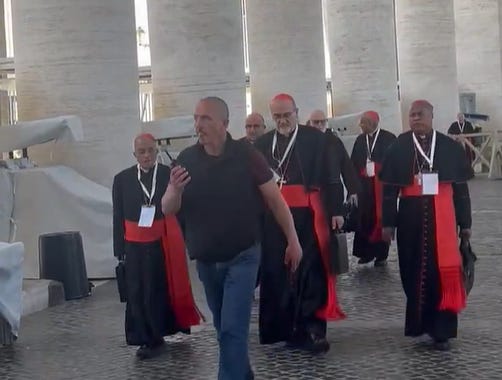
Conclaves Have Always Been Political
While we must trust in the positive influence of the Holy Spirit on the deliberations of the cardinals, the coming Papal conclave is, however much we might wish otherwise, a political event. It is an action of men deliberating on the good of a human institution and how that goal can be practically accomplished through choosing a man to be its head. Yes, the Church is also a Divine institution, but Christ entrusted the caretaking of His body to human vicars with human limitations, motivations, and the capacity to resist and ignore the grace for prudent and wise deliberation proffered to them by the Holy Spirit.
You’re probably thinking of the last pontificate, but your emotions ought to be equally applied to really any of the Popes in the 14th or 15th centuries:
Anthony Jones rightly reminded me of Cardinal Ratzinger’s summary of the political nature of the selection of each Pope: the Holy Spirit does not force the cardinals’ hands, but merely assures that God will aid their deliberations, confirm their choice to be the valid Pope, and prevent things from becoming completely ruined while bringing some sort of good out of the pontificate of the man they have chosen:
I would not say so, in the sense that the Holy Spirit picks out the pope. . . . I would say that the Spirit does not exactly take control of the affair, but rather like a good educator, as it were, leaves us much space, much freedom, without entirely abandoning us. Thus the Spirit’s role should be understood in a much more elastic sense, not that he dictates the candidate for whom one must vote. Probably the only assurance he offers is that the thing cannot be totally ruined.1
But while every conclave has thus been political, and many have been notoriously political in the derogatory sense of the word, where interests of status, pride, and envy have more bearing on the process than the cardinals’ aforementioned cooperation with the Holy Spirit,2 this one already seems to be far more politicized and public than any in recent memory.
For the first time in centuries, it seems that “average-Catholics” believe they have—and perhaps actually might—a real chance of affecting the outcome.
This is at first counterintuitive. Over the twelve years of his centralizing and, as some have characterized, dictatorial pontificate, Francis selected 108 of the 135 cardinals currently eligible to vote. One would think that the pathway to a successor in Pope Francis’s left-liberal ideological mold would be clear, insofar as we can reasonably apply our national political labels to the princes of the Church. But while Francis and his liberal allies selected a supermajority of the cardinal-electors, many of them, especially the Africans, have pushed back on the former-pontiff’s sketchier actions and priorities, making the true ideological character of the college vague to us as well as to the cardinals themselves. Apparently, “many have never met face to face,” the cardinals don’t know each other all too well either, Francis, favoring whatever synodality meant, not having called them to convene all too often. The constant confusion, the radical centralization of Church governance into Francis’ new bureaucracies that reduced the college’s role in the Church, and the general style of Francis weren’t all that appreciated either, amidst even some of the more liberal of the cardinals. While many are focusing on the progressive to conservative political axis, the last twelve years have added a slightly separate—and murkier to determine—new dividing axis amidst the cardinals from those favoring stability and formality versus styles more charismatic and brash.3
An Atmosphere of Chaos
For the largest conclave ever in history, however, these factors combine with the social-media-oriented era of information to create a situation ripe for chaos.
For one, the younger recently installed cardinals will naturally be looking to their elder, more well-connected counterparts for guidance. This would seem to boost the chances of the “deep Church” liberals to put in another Francis-like liberal. But again, many of the cardinals are reportedly jaded, cynical, and skeptical, meaning that many will counter-signal and look to other sources, like the astoundingly well-produced College of Cardinals Report, for external guidance on each other.4
As they seek out information, realizing as many of them do that the faithful Catholic laity are also quite aggrieved at how the last ten years have gone, they’re primed to have a number of fears amping up in their minds at once: “What will happen if we elect another ‘dictatorial’ Pope like Francis and I fall out favor? What will happen if we elect a pope who looks into our crimes?5 What will happen if the laity revolts against a liberal? What do the laity think?”
The current media landscape, in directing intense pressure by the faithful on all the papabili—and all the cardinals—is making a lot of them sweat in a way their predecessors didn’t in 2005 and 2013.
Fear of the laity—the mob in the cardinals’ minds—is sure to be wearing down hard on them. Fear of each other, similarly, is also there.
And so the pressure is on for all to seek out information harder, to dig into each other, only mimetically amping up the purity spiral of investigative inquiry even further. And further. And while the Chinese CCP is certainly trying to influence things, there also isn’t a CIA or USAID that’s as ready to tell and cajole each cardinal in how to vote as they did the last few times around. Less than normal, at the very least.6
The cardinals in their inquiries are thus, out of their fear, opening the process up to a decentralized external manipulation and intrigue in ways that haven’t been seen since the 16th-century mobs on the streets of Rome.
The Online Psy-War of Narratives
But this conflict and these mobs are virtual. This time around, I see, in the current world of conclave discussion, the same type of psychological warfare going on that
at ’s recently described in the context of global political and geopolitical conflict:It’s a psychic war of attrition, where the goal is to capture territory in the minds of other populations, while maintaining hold of the minds at home. This is a 5GW conflict fought with memetics, social media, artificial intelligence, disinformation campaigns [… and] open-source intelligence. […] The Cold War was a sort of top-down, one-to-many, server-client sort of propaganda war, in which the vast bulk of the population on either side were dupes of the hidden masters in the spy agencies; this conflict is run on a many-to-many, peer-to-peer model, in which everyone involved knows full well what they’re doing, and everyone is part-spy and part-dupe.7
The Internet has been covering the conclave exactly like a presidential election or all of our current mimetic frenzies known as “current things”, complete with all the mimetic psy-ops, disinformation, and media machinations of Carter’s description of our current worldwide Fifth Generation Warfare (5GW) psy-war. The battle for the soul of the Church and the outcome of this particular conclave is a psychological war being waged in a distributed way by every faction on every other faction for control of your (and the cardinals’) minds.
Let’s look into the current global psy-war for the Church.
We get all the October Surprises meant to discredit certain candidates who probably deserve it. They might, but these videos are being released now as psy-ops, the aim of LifeSiteNews being to influence the public to take a particular view of Tagle:
The cringey music videos by supporters:
The celebrity endorsements (or un-endorsements, given that this video that made waves was by a pornographer Jewish rabbi who is a Cardinal Parolin “supporter”):
Of course, we’re also getting the leaks (analogous in a presidential election to leaked internal polling) claiming that Parolin, the CCP’s favorite, has it in the bag by adopting a counter-signaling psy-op of pretending to be against Pope Francis’s legacy:
Or that, simultaneously, Cardinal Parolin is sick and has therefore lost all his support:
There are all the millions being bet on Polymarket right now, supposedly having Cardinals Parolin, Tagle, Turkson, and Zuppi way up in the odds:
Even as conservative traditionalists are trying to meme their way into building grassroots pressure behind Cardinal Sarah:
Are We Influencing the Conclave?
We, of course, don’t know for certain how much the cardinals are listening to the faithful. But certainly people do believe that they are influenceable. And if any the cardinals believe that their fellow-cardinals, are being influenced, well, then the psy-op works, as happened in the election of Pope Leo X, Giovanni de' Medici, who started a rumor that he had bought off enough cardinals to win, making the cardinals, none of them wanting to be on the losing side of the vote, elect him.
There’s a strong possibility that a lot of what we’re seeing in the news and social media right now is attempts at recreating this, outside forces attempting to influence the cardinals by influencing public opinion with mimetic, quick spreading, psy-op rumors.
Or perhaps we’re once again in something like the 14th century, where certain cardinals, fearing the Roman mob that demanded an Italian pope after years of French domination, made a pact together and elected a non-cardinal as Urban VI (before reneging and “electing” a French anti-Pope anyway and launching the Great Western Schism). Only this time, perhaps the traditionally minded faithful are the equivalent of the Roman citizenry, their demands are for the Traditional Latin Mass, and the candidate might be someone like Parolin, who agrees to undo Traditionis Custodes in exchange for conservative support. Someone’s already started that rumor. (Would the German bishops launching a schism to continue their gay blessings and self-immolation be today’s equivalent of the schism of 1378?) Unless that rumor is complete propaganda from leftists aiming to discredit Parolin in order to get someone even further to the left.
One guess I have is that the current plan of the liberal cardinals could be to make Parolin look like a moderate by talking about the even wilder Tagle. It’s the same modus operandi George Soros used to get leftist prosecutors elected, by sponsoring another candidate even further to the left, manipulating the Overton Window. Or if the cardinals see that Parolin no longer seems to “have the vibes”, perhaps there’s something to Francis’s ally Cardinal Prevost, Prefect of the Dicastery for Bishops, being seen meeting with Cardinal Burke?
All of this, it’s needless to say, makes the conclave rather more unpredictable. The fog of war, propaganda, lies, memes, music videos, rumors, leaks, and jokes make it impossible to really know what’s happening, or what even could happen, as there are so many contrary pressures on the cardinals simultaneously. While people are trying to influence us, we are also active agents who can influence each other and thereby the public consciousness as a whole, and perhaps through them, the cardinals.
We can, at least, try… There is no penalty for trying.
Perhaps a cardinal might be reading this article, or have watched my satirical video making fun of the Dimond brothers making fun of Tagle?
Once it’s all said and done, the current possibilities are very wide, from a conservative like Cardinal Robert Sarah, Erdo, or Pizzaballa all the way to a second Francis like Cardinal Tagle, a quiet-CCP-allied-leftist like Parolin, or even the incoherently woke-homosexual-supporting-even-while Latin-Mass-loving-Cardinal Zuppi.8
Will Synodality Defeat Pope Francis’s Legacy?
But, oddly enough, if we do have, as I believe is very possible, as lay Catholics, the chance to influence the election through our articles, Tweets, posts, etc., perhaps Pope Francis’s legacy will wind up putting an ironic twist on the Pope’s jumbled legacy.
Francis’s flagship project of “synodality,” as liberals in the Church define it, was advertised as fraternal collaboration and discernment where the entire People of God would participate in the life and mission of the Church, or in other words, that the faithful would participate and have a voice in Church politicking. The various synodality projects over the last decade, however, achieved perfection at becoming the exact opposite of what they were talked up as becoming during Francis’s pontificate, being mere window dressing on the commands being given at the barrel of a gun to “be more homosexual, more morally pernicious, and woke.”
But if the faithful laity do, in this unique circumstance, have an influence on the conclave, and a positive influence, the fear of the faithful or the influence and advice thereof pushing the cardinals to select a traditionally minded conservative, then perhaps synodality, in the end, will defeat the legacy of Pope Francis.
Given the chaos that all signs point to being the current state of the conclave, it’s likely that even a small effect by the faithful could tip the balance one way or another.
And even if the cardinals aren’t directly listening, even if the worst of our fears are true and they have all their new colleagues locked up by psy-ops, bribed, or blackmailed into electing us another woke Pope, we as the faithful still can redeem and transfigure the sordid legacy of synodality. The Church’s politics don’t merely involve human powers, psy-ops, cabals, and intelligence agencies. We can “participate in the life and mission of the Church” or, uhh, do synodality by asking other higher agents and powers to aid the cardinals.
As members of a human and divine institution, this is the politicking and synodality of the Church that is always open to us. This prayer is the synodality of tradition that we all can do without interference. And if we pray it in community with others, we’re doing church politicking!
And wouldn’t it just be funny if this conclave ends up, by being the most synodal in either of these senses in history, electing a Pope who undoes the legacy of the Pope who made synodality his biggest talking point?
St. Catherine of Siena certainly did some great politicking and synodality in her time!
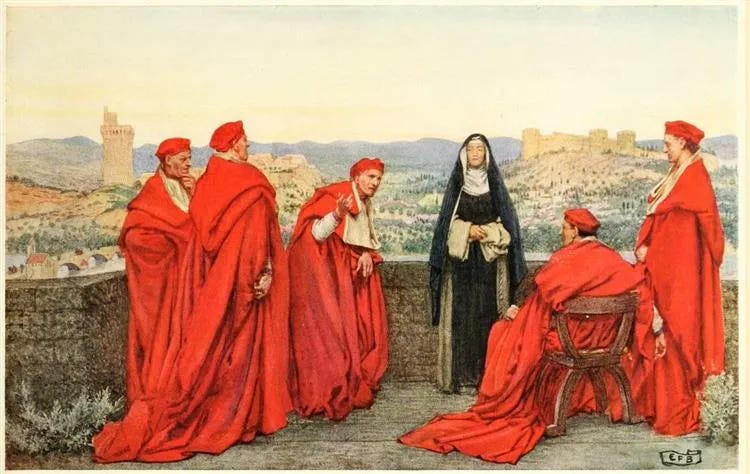
Some pure laughs that I just had to include:
1997 interview of Cardinal Ratzinger on Bavarian television as quoted by the National Catholic Register in 2013: https://www.ncregister.com/blog/the-next-pope-will-be-gods-choice-right
You’re thinking of recent Popes, but take a look at the 15th century and Popes Alexander VI or Innocent VIII, and you might actually feel better about the last sixty years.
For Andrea Riccardi, founder of the Community of Sant'Egidio and an expert on Vatican dynamics, the alignments in the conclave this time will not be pigeonholed into the traditional categories of progressives and conservatives.
"They no longer hold up in today's Church," he said. Rather than an ideological divide, the real issue will be deciding whether to stabilize the institution after Francis, or whether to continue along the path of a charismatic and evangelizing pastor.
My favorite video on the cardinals’ backgrounds is Christian Wagner’s deep dive:
For those who have covered up criminal abuse, and the swindling and mismanagement of the Church’s resources.
Influence attempts from state actors will likely be lower than normal, given the aforementioned circumstances, but historian Roberto de Matteii gives us a good baseline sense of what level of interference has been historically “normal”:
In the conclave of 1769, Clement XIV was elected after 185 ballots and more than three months of negotiations, after pledging to the Bourbon courts to suppress the Society of Jesus. Emperor Franz Joseph of Austria, in the 1903 conclave that elected St. Pius X, vetoed the election of Cardinal Rampolla del Tindaro. But the conclave that elected Pius XII, and especially the one that followed his death, also came under political pressure. In 1958, the most intrusive diplomatic action was led by General De Gaulle's France, which prescribed that its ambassador to the Holy See, Roland de Margerie, do everything to prevent the election of Cardinals Ottaviani and Ruffini, who were considered “reactionaries.” Instead, the “French party,” which was headed by the Dean, Cardinal Eugene Tisserant, supported Patriarch Giuseppe Roncalli of Venice, who was elected as John XXIII. In more recent times, the maneuvers of the so-called “St. Gallen Mafia” in the conclaves of 2005 and 2013 to prevent the election of Benedict XVI and then to secure that of Pope Francis are well known. The first maneuver failed, but the second succeeded
In other words, an Episcopalian.


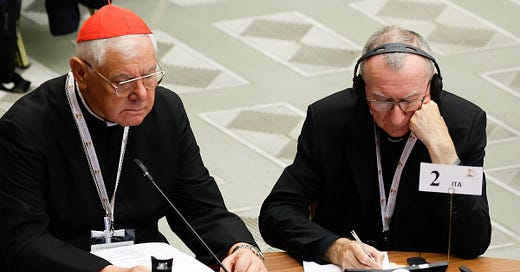




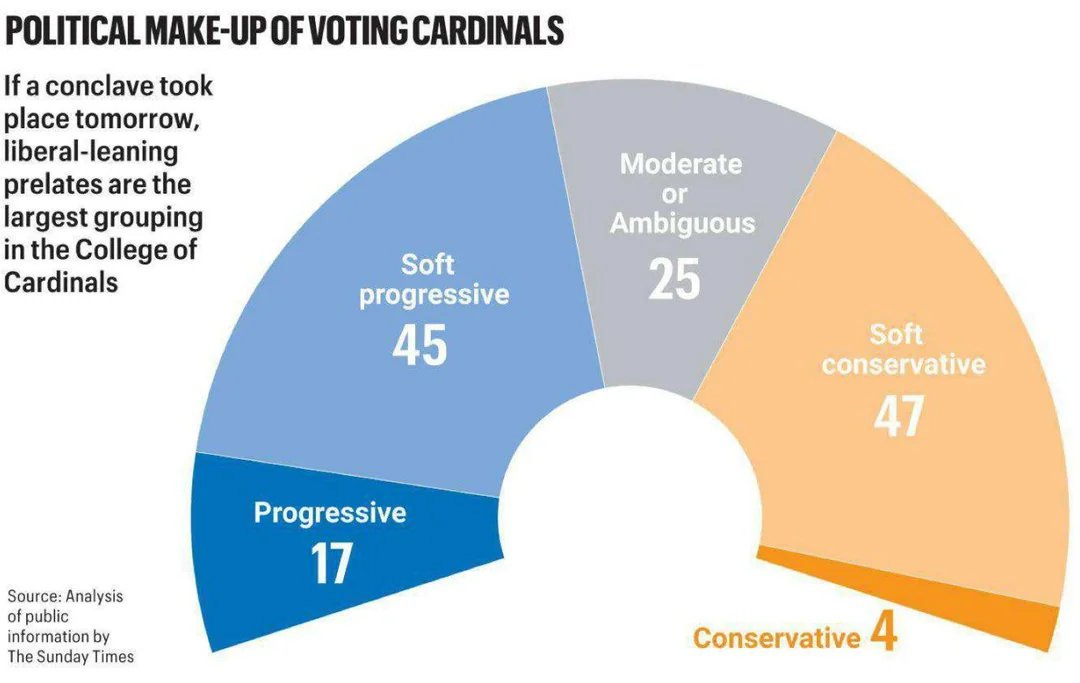






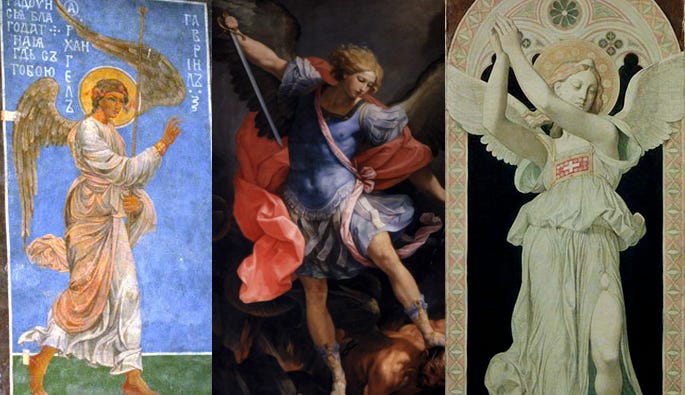
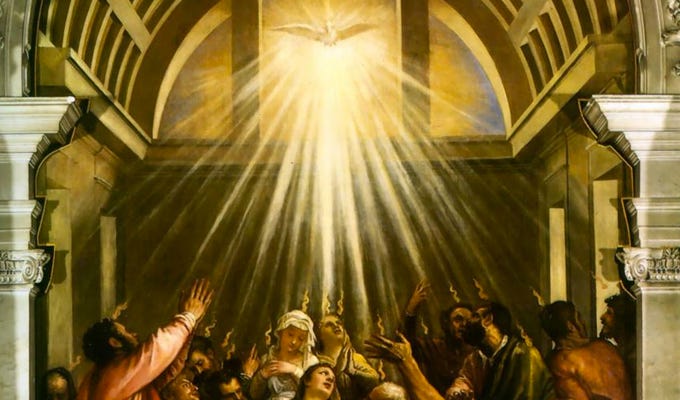
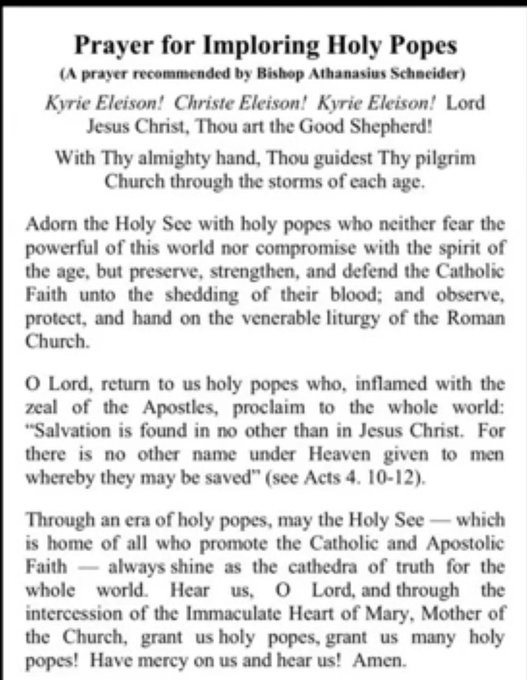

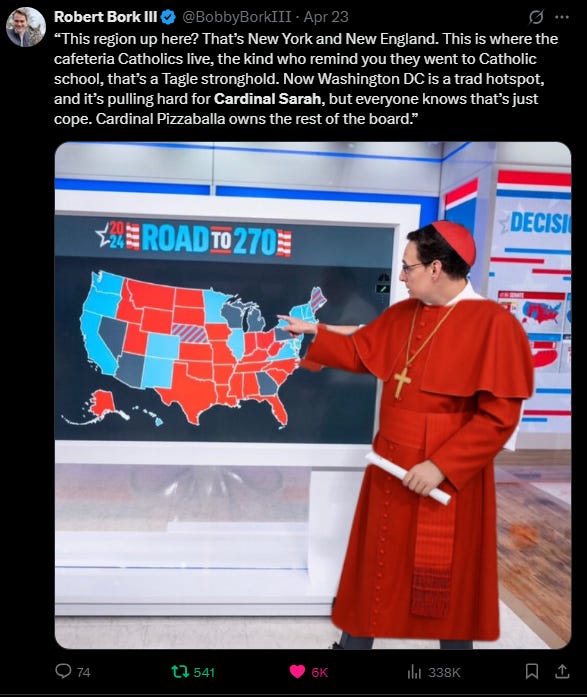


Another helpful related essay on the topic: https://www.traditionsanity.com/p/conclave-special-does-the-holy-spirit